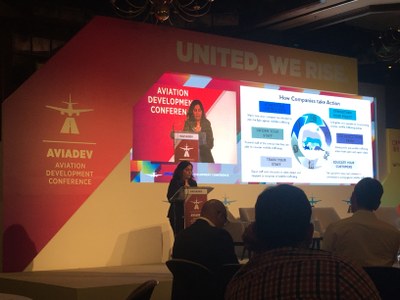ROUTES calls on airline industry to help stop the trafficking of wildlife
Jun 18, 2018
“Wildlife trafficking is a global challenge. The very existence of wildlife is being threatened,” WWF private sector engagement team director Afsoon Namini, told delegates at the AviaDev conference, in Cape Town, this week.
“It is putting pressure on vulnerable species. The safety and health of passengers and staff as well as the public are also being compromised.”
Namini said transport routes between Africa and Asia were particularly fraught with illegal trafficking of everything from rhino horn to reptiles and birds.
Illegal trafficking of wildlife was also linked to other crime.
“This trafficking doesn’t exist in a vacuum, putting companies and countries at risk. If wildlife is being trafficked, chances are that other illegal goods are being trafficked too.”
The WWF director outlined the scale and impact of illegal wildlife trafficking.
“About 55 elephants are killed every day for their ivory. A rhino is killed every eight hours for its horn. About 317 000 live birds are trafficked annually. A ranger is killed in the line of duty, on average, every three days.”
“This trafficking doesn’t exist in a vacuum, putting companies and countries at risk. If wildlife is being trafficked, chances are that other illegal goods are being trafficked too.”
Namini, who travelled from the US to give her presentation to the conference, called on companies to train staff to safely detect and respond to instances of wildlife trafficking. She suggested airports and airlines have a whistleblower policy so that people aren’t afraid or wary of reporting incidents.
“We need to create an industry shift where airline staff know how to detect and report wildlife crime. Companies need to create standard reporting processes so that staff know who to alert if they suspect something.”
She said airlines should share their success stories with customers and raise awareness of trafficking.
“Taking action against wildlife crime is commendable. Share the great work you're doing with your customers in in-flight magazines and in other ways.”
Namini said airlines should incorporate counter wildlife trafficking policies and advocate among their peers and supply chains.
“Illegal wildlife trafficking is a business reputational risk. The possibility of negative press and reports can hurt your brand. Negative publicity can also lead to reduced wildlife populations affecting tourism revenue.”
The WWF is a key partner in the Reducing Opportunities for Unlawful Transport of Endangered Species (ROUTES) partnership funded by USAID. The partnerships bring together government agencies, companies in the logistics industry and international conservation, development and law enforcement organisations, and donors, in a bid to disrupt wildlife trafficking.
Wildlife traffickers exploit the increasing connectivity of global transportation, online markets and gaps in law enforcement to traffic live and dead animals and products.
Namini explained that ROUTES worked to disrupt wildlife trafficking along transportation supply chains through improved data analytics, engaging corporate leaders, training transport personal, strengthening policies and increasing client awareness.


